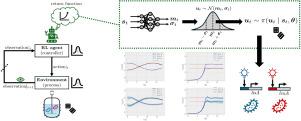Reinforcement learning for efficient and robust multi-setpoint and multi-trajectory tracking in bioprocesses
IF 3.9
2区 工程技术
Q2 COMPUTER SCIENCE, INTERDISCIPLINARY APPLICATIONS
引用次数: 0
Abstract
Efficient and robust bioprocess control is essential for maximizing performance and adaptability in advanced biotechnological systems. In this work, we present a reinforcement-learning framework for multi-setpoint and multi-trajectory tracking. Tracking multiple setpoints and time-varying trajectories in reinforcement learning is challenging due to the complexity of balancing multiple objectives, a difficulty further exacerbated by system uncertainties such as uncertain initial conditions and stochastic dynamics. This challenge is relevant, e.g., in bioprocesses involving microbial consortia, where precise control over population compositions is required. We introduce a novel return function based on multiplicative reciprocal saturation functions, which explicitly couples reward gains to the simultaneous satisfaction of multiple references. Through a case study involving light-mediated cybergenetic growth control in microbial consortia, we demonstrate via computational experiments that our approach achieves faster convergence, improved stability, and superior control compliance compared to conventional quadratic-cost-based return functions. Moreover, our method enables tuning of the saturation function’s parameters, shaping the learning process and policy updates. By incorporating system uncertainties, our framework also demonstrates robustness, a key requirement in industrial bioprocessing. Overall, this work advances reinforcement-learning-based control strategies in bioprocess engineering, with implications in the broader field of process and systems engineering.

生物过程中高效鲁棒多设定值多轨迹跟踪的强化学习
在先进的生物技术系统中,高效和稳健的生物过程控制对于最大限度地提高性能和适应性至关重要。在这项工作中,我们提出了一个用于多设定点和多轨迹跟踪的强化学习框架。由于平衡多个目标的复杂性,在强化学习中跟踪多个设定值和时变轨迹是具有挑战性的,系统的不确定性(如不确定初始条件和随机动力学)进一步加剧了这一困难。这一挑战是相关的,例如,在涉及微生物联合体的生物过程中,需要对种群组成进行精确控制。我们引入了一种新的基于乘法互反饱和函数的返回函数,它显式地将奖励增益与多个引用的同时满足耦合在一起。通过一个涉及光介导的微生物群体遗传生长控制的案例研究,我们通过计算实验证明,与传统的基于成本的二次回归函数相比,我们的方法实现了更快的收敛、更好的稳定性和更好的控制依从性。此外,我们的方法可以调整饱和函数的参数,塑造学习过程和策略更新。通过纳入系统的不确定性,我们的框架也证明了鲁棒性,这是工业生物加工的关键要求。总的来说,这项工作推进了生物过程工程中基于强化学习的控制策略,在过程和系统工程的更广泛领域具有重要意义。
本文章由计算机程序翻译,如有差异,请以英文原文为准。
求助全文
约1分钟内获得全文
求助全文
来源期刊

Computers & Chemical Engineering
工程技术-工程:化工
CiteScore
8.70
自引率
14.00%
发文量
374
审稿时长
70 days
期刊介绍:
Computers & Chemical Engineering is primarily a journal of record for new developments in the application of computing and systems technology to chemical engineering problems.
 求助内容:
求助内容: 应助结果提醒方式:
应助结果提醒方式:


